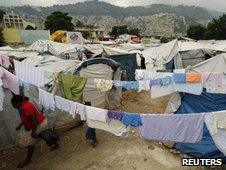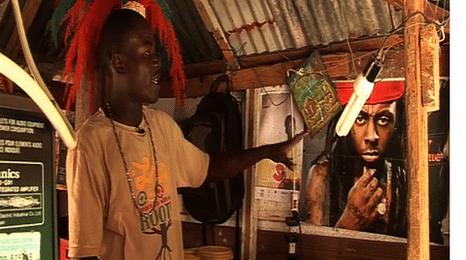Rape at 'crisis' level in Haiti earthquake camps
- Published
They often come armed with knives and pistols. In darkness, they slit open tents and rape the women inside.
In Haiti, we're told this is a common story.
Sexual abuse has always been widespread in the Caribbean country, but human rights group Amnesty International insists it's got dramatically worse since the earthquake a year ago.
The capital Port-au-Prince is now full of tents and homemade shelters where people who lost their homes live.
Many are women. Some live alone, others with their children.
The conditions are ghastly - one child we saw drank dirty water from the same bucket he urinated in.
'Violently raped'
The United Nations Population Fund (UNFPA) estimates 750,000 women and girls of childbearing age were affected by the disaster which killed hundreds of thousands of people.
Shirley is one them. She's 19 years old and her parents were killed in the quake.
She had no choice but to live in a tent by herself in the overcrowded camp, Champ De Mars. One night soon after moving there, she was violently raped.
"In the night it was raining. I was in my tent and one man came in, kicked me in the belly.
"He then raped me. I screamed but nobody could hear me because of the rain.
"I bled non-stop for three months afterwards," said Shirley.
'Fear of dark'
Amnesty International claims hundreds of women in Haiti share the same experience and is calling on the government to do something about what it calls "a humanitarian crisis".

Amnesty International says the threat to women is a "humanitarian crisis"
The problem is said to lie in the camps which have little to no security making females living there more vulnerable to sexual attacks.
Carole, 28, says she fears for her life each time darkness falls.
"Sometimes they burst into my tent and force themselves on me but I scream and they run away.
"My family is all dead now. I am completely alone and lost and I don't know what to do."
People tell Newsbeat it happens because the attackers are more likely to get away with it.
The justice system broke down after the disaster. Police stations and court houses were destroyed or severely damaged, making it more difficult to report attacks and convict criminals.
The country is also struggling without a sufficiently sized police force. Some claim they're even corrupt and abuse women themselves.
Child victims
Survivors of sexual violence have set up shelters for victims of rape.
Kofaviv is an organisation that seeks justice for rape victims.
It runs a school at the top of a steep stoned hill. Inside, more than 40 women sing for freedom from abuse and prejudice.
They hold hands and look up to the beaming sky in hope for a brighter future.
Josie Philistin is the project co-ordinator at the school.
She said: "After the earthquake we received lots of victims but maybe 80% are adolescent.
"We have also lots younger, maybe five years old, who have been raped."
The victims are fed but not housed, so they have to return to the camps at night.
For Shirley it's a terrifying journey back to the streets where nightfall could bring more violence and abuse.
"I miss my family," she said. "They took care of me. Now nobody does."
Follow Newsbeat's US reporter Sima Kotecha on Twitter, external
- Published12 January 2011
